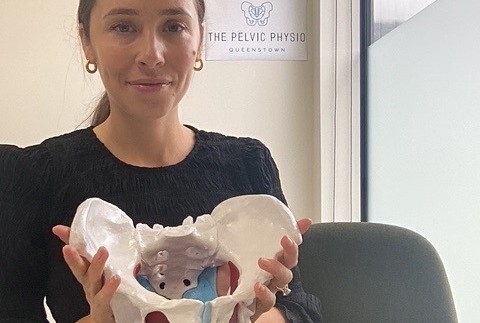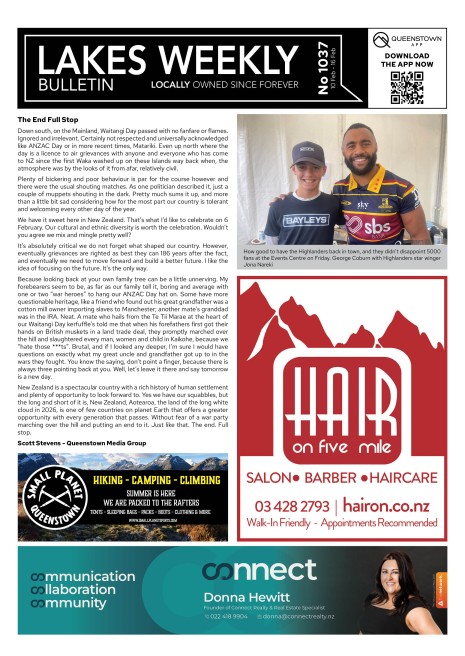Pelvic health - pay attention down there!

For most new mums daily pelvic floor exercises can seem like a drag but the experts say if they don’t do them, it will be.
Pelvic physiotherapy is now a readily available specialist area with several highly-qualified practitioners – private and publicly-funded, in Queenstown, sporting long waiting lists as demand increases.
It’s not just the girls who need to pay attention down there, but The Pelvic Physio Queenstown owner Meesha Powell sees a good number of male patients, referred by GPs, too.
Powell, who hails from Perth with a post-graduate qualification, says pelvic physiotherapy has come into its own in the last 10 years. “With recent changes providing ACC funding there’s more awareness and accessibility to pelvic help.”
Setting up practice in 2022, Powell says the area was quite behind in its pelvic health offerings. “There was no solid referral network, but it’s definitely happening now, and the GPs are very supportive and onto it.”
That assessment early on when initial problems arise can help offload specialist urologist waitlists and avoid surgical interventions, she says.
Awareness and education start before birth and Powell says there are now some excellent pelvic health programmes and classes offered locally.
It’s not a one size, fits all area though. While there are various apps and devices that can help engage the pelvic floor, she urges women to get that six-week post-natal check to ensure their exercises are safe and suitable for them.
And long after the babies have grown, the leakage can begin, Powell says.
“Despite what older women may think, any kind of urinary leakage is not normal,” she says.
Left unchecked, even minor bladder and bowel prolapses can become more serious and eventually require surgery.
“A major part of women’s health is incontinence and organ prolapse, and symptoms do appear as women age with perimenopause and menopause symptoms,” she says. “But if you keep up a good baseline of pelvic health, you’re less likely to have those symptoms or that leakage.”
While the “gold standard” detection is a vaginal examination, many patients prefer real time ultrasound which gives women and men a direct visual of what’s happening when they contract their pelvic floor. “It’s like a training device or tool. We’re leaning more towards this digital ultrasound which is a great advantage for men,” she says. “We screen for signs of prostate problems and if we detect anything we bring a urologist on board.”
Most men she sees are experiencing urinary problems related to their prostate and bowel dysfunction. “We work on bowel management, constipation and straining. Men I treat come in for rectal problems like hemorrhoids and rectal prolapse. Increasingly GPs are referring men.”
While younger men are becoming more proactive there’s usually a lack of awareness, many men finding it difficult to urinate.
She does see a few children too with bowel and bladder leakages, and some young endometriosis patients. “Although we’re better at treating that through the holistic picture now with diet and lifestyle.”
In 2024 the NZ Medical Journal says 43.5% of women aged from 16 to 74 had some sort of urinary incontinence, while 50% of women 50-years-plus had leakage.
“Women are four times as likely as men to have incontinence.”
Powell believes Kiwi women could be a bit better supported by our healthcare system, being more heard and seen. “I do get clients who say they’ve had this problem for 10 years and nobody they’ve seen has done anything about it. It’s not normal to leak urine so don’t be dismissive. There’s ACC help now so be proactive in seeking help.”
Women’s health physio Kate Campbell, who operates out of Lakes District Hospital, treats a lot of local women for ACC maternal birth injuries and post-natal pelvic floor issues, from bladder and bowel problems to prolapses. With all her patients by referral only, Campbell says many of the birth injury problems can be largely preventable with education.
“I see a lot of peri or postmenopausal women with bladder problems where low estrogen is a major factor, which for some, a script for topical vaginal estrogen can make a big difference. It’s a big trend,” she says.
“We need more education about hormone health and how hormones affect the pelvic floor,” she says. A lack of vaginal estrogen or low pelvic estrogen can contribute to bladder incontinence, or urgency, and worsen prolapse symptoms. “It just makes the vagina irritable and grumpy,” she says.
She’d love to see more public funding for care leading up to birth. “Pre-birth screening can identify who’s at risk and who’s not.”
Birth injury patients, including migrant women who’ve birthed here, are publicly funded but as a part-timer her waiting list for other issues is “pretty significant” with up to 20 women currently waiting.
Early signs: Urinary leakage that persists after six weeks
Watch for: Changes in bladder and bowel emptying habits – not quite feeling that’s complete









